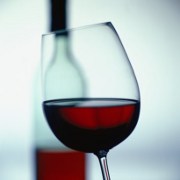 Photo: Getty Images
Photo: Getty Images
In the last decade there have been constant reports suggesting that red wine may have protective effects on the heart. With this research there has been an explosion in the sale of red wine in North America. Red wines sales are up by more than 100 percent over white wine.
The benefits of red wine appear to be associated with the presence of melatonin, flavonoids and resveratrol. Resveratrol is produced naturally from the skin of grapes during the fermentation process. Studies continue to report that not only does red wine keep the heart healthy, but also delays the aging process.
Based on these findings, many people have started to consume large amounts of antioxidant extracts of red wine, like the polyphenols and flavonoids. But is this of any benefit?
The latest study by LLSE PG Botden, MD from University Medical Center in Rotterdam, the Netherlands, indicates that just taking the red wine supplements has no affect on high blood pressure. In this small double blind study, individuals were give red wine or polyphenols extracts.
After each four-week period, the blood pressure and other heart parameters were measured. The group taking polyphenols did not have any measurable effect on blood pressure. The conclusion from this study was that red wine polyphenols do not have any affect on blood pressure (1).
So how red wine protects the heart still remains unknown. Moreover what ingredient(s) in red wine is responsible for the beneficial effects on the heart remains elusive. The studies on resveratrol have not been convincing or reproducible (2).
What should consumers do?
In my opinion, there is too much made about red wine and its medical benefits. What is almost never mentioned is that while some Europeans who consume red wine do have heart benefits, they also develop fair amount liver disease and alcohol dependence.
Moreover, red wine can trigger migraines, raise the triglyceride levels and each glass of wine adds close to 120 calories.
There is no magic bullet for maintaining good health. For consumers who want to prevent illnesses, the best advice is to discontinue smoking, walk regularly, eat a diet low in fats and high in veggies ... and yes, take a glass of red wine with each meal.
Sources:
Botden I, et al "Red wine polyphenols do not lower peripheral or central blood pressure in mild hypertension. A randomized, double-blind crossover trial" HBPR 2011, Abstract P497.
Abstract : http://www.theheart.org/article/1284317.do
2. Wang et al. Resveratrol in cardiovascular disease: what is known from current research? Heart Fail Rev. 2011 Jun 19.
Abstract: http://www.ncbi.nlm.nih.gov/pubmed/21688187
Reviewed September 28, 2011
by Michele Blacksberg RN
Edited by Jody Smith




Add a Comment1 Comments
Sorry but the stuff has lowered my blood pressure, caused me to loose 14 lbs , some hair on my bald head has grown back.(I am a man) A friend who takes it and has other serious maladies diabetes has had his blood sugar levels stay stable, is loosing 4,5 lbs a month and has had other benefits. His doctors have asked what the hell are you doing?
I inderstand that my statements are anecdotal and should be taken as such. But I couldn't resist pasting an article pertainent to many women that is new and contradicts the conclusion of the article.
I just want people to realize their are many different viewpoints and differing conclusions about this subject (and most others) and they should look into things further and come to their own conclusions as the subject pertains to them.
Best of luck to all.
New studies confirm health benefits of red wine
Presswire, 27 September 2011
Two new meta studies published in the Journal Nature, one authored by Dr. David Gems, and the second one by Drs. Auwerx and Canto, examine previous studies of red wine's ability to promote human health and longevity.
The compound which is contained in red wine which was the subject of the study is called resveratrol. Resveratrol specialist James Betz of Biotivia, a biotech company involved in the study of this compound commented on the two studies.
Resveratrol was first identified as an activator of enzymes known as sitruins by Dr David Sinclair of Harvard and his work was also published in the prestigious journal Nature in 2006. Since that time over 5,000 additional studies of resveratrol have been undertaken. The vast majority of these studies elucidate impressive potential health benefits of the red wine molecule. Although most of these studies were done on animals or in the lab, since 2009 a significant number, using a purified form of resveratrol called transmax resveratrol, have been done on human subjects. In these clinical trials resveratrol was shown to improve blood glucose tolerance in pre diabetic subjects, increase brain blood flow in university students, increase fitness in both training and sedentary subjects and to have a wide range of other beneficial health effects.
In the two new Nature studies it was confirmed that resveratrol does activate the so-called anti-aging genes Sirt 1 and 2, but that the primary benefits of this effect is to promote resistance to the diseases of aging such as diabetes and other chronic conditions, not necessarily to directly increase lifespan. Studies on human longevity are extremely difficult to conduct due to the inability of the researchers to control for the thousands of factors which influence lifespan. The medical community prefers to focus on Healthspan, which is the number of years a person lives free of the debilitating diseases which often accompany the later years of a person's life. The idea is that if diseases including cancer, diabetes, heart disease and Alzheimer's disease can be prevented one's quality of life is dramatically improved and the cost of health care to the nation is greatly reduced. If the shift to prevention vs remedial health care is not accomplished within the next ten years the cost of providing health care to the citizens of every developed country will exceed the total public budget by 2025 according to leading economists. Resveratrol is one of the compounds which could make a significant contribution to the shift to a prevention centric health care strategy in the US and Europe. Dr. Auwerx stated “Similarly, indirect activation of SIRT1 by the compound resveratrol protects against metabolic and age-related diseases.” He goes on to state “SIRT1 activation remains a promising approach to delaying general age-related physiological decline and to treating numerous inherited and acquired diseases...
At this point the jury is still out on whether resveratrol will make one live longer however if it prevents an individual from contracting cancer or diabetes or one of the other diseases of aging, for that person it will certainly increase improve the person's health span and quality of life, if not his life span.
One thing is clear. As the Dr Auwerx points out, the astonishing ability of SIRT1 to enhance 'Healthspan' by promoting metabolic fitness will also guarantee it a long life as a subject for further exciting research. Biotivia will continue to support human clinical trials of resveratrol worldwide.
September 29, 2011 - 12:00pmThis Comment